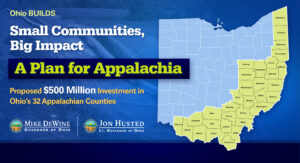State announces proposal for investment in Appalachian counties, including Ross
(COLUMBUS, Ohio) — Ohio Governor Mike DeWine and Lt. Governor Jon Husted today announced details of their proposal to make a long-overdue, comprehensive investment in the Appalachian region of Ohio.
The $500 million investment would support local initiatives to revitalize downtown districts, enhance quality of life, and help rebuild the economies of Ohio’s 32 Appalachian counties.
“The story of Ohio began with the pioneers in Appalachia, and it is now time to turn the page to a new and exciting chapter in this region’s future,” said Governor DeWine. “The plan that we are proposing today will energize our Appalachian communities so that the next generation of pioneers can forge new paths and secure a better future for this region.”
The $500 million proposal, dubbed “Ohio BUILDS – Small Communities, Big Impact – A Plan for Appalachia” would infuse funding into the proposal’s three priority areas of restoring historic downtowns, improving community health, and rebuilding the local workforce.
“We have entered an era where people can live in one place and work in another,” said Lt. Governor Jon Husted. “This means with the right kind of technology infrastructure, educational opportunities, affordable living with a high quality of life that rural communities have more opportunities than ever—this proposal will help make this possibility a reality.”
The proposal includes a $50 million planning phase to allow Appalachian communities and regional partnerships to develop plans that incorporate each of the three funding priorities. Following the planning, $450 million in implementation grants would be invested to help communities and regional groups carry out qualifying projects to rejuvenate the region and stimulate economic growth.
“I believe this investment will truly be the support that the Appalachian region needs to ensure long-term sustainable impacts,” said Lydia Mihalik, director of the Ohio Department of Development. “We look forward to working with the local communities to create solutions and cultivate success in the region.”
Since the beginning of the DeWine-Husted Administration, the Ohio Department of Development has invested more than $472 million in Appalachia Ohio to improve infrastructure, expand broadband access, and boost development. This new proposal aims to build on those investments by prioritizing funding to create vibrant downtowns, recreational areas, and cultural attractions to draw residents and tourists to the region; provide much-needed health care services to area residents and address substance use disorder; and develop the local workforce to prepare the next generation for jobs of the future.
“I have been representing Appalachia throughout my career, and I know the opportunities that exist in our region,” said Governor’s Office of Appalachia Director John Carey. “On behalf of my fellow Appalachians, I’m incredibly grateful for Governor DeWine’s commitment to help provide opportunities for this wonderful place that so many of us call home.”
The 32-county Appalachian region covers 39% of the state, from Clermont County through the southern and eastern portions of state, north to Ashtabula. The region is historically economically disadvantaged and sparsely populated, with 124 persons per square mile compared to the statewide average of 285.
Ohio’s 32 contiguous Appalachian counties are: Adams, Ashtabula, Athens, Belmont, Brown, Carroll, Clermont, Columbiana, Coshocton, Gallia, Guernsey, Harrison, Highland, Hocking, Holmes, Jackson, Jefferson, Lawrence, Mahoning, Meigs, Monroe, Morgan, Muskingum, Noble, Perry, Pike, Ross, Scioto, Trumbull, Tuscarawas, Vinton, and Washington.
Once funding is secured, the program is to be administered through the Ohio Governor’s Office of Appalachia within the Ohio Department of Development and other agency partners. The program will be part of Governor DeWine’s Ohio BUILDS Initiative, which focuses on supporting targeted solutions that impact quality of life, such as water infrastructure improvements, broadband expansion, brownfield redevelopment, the demolition of blighted buildings, and more.
